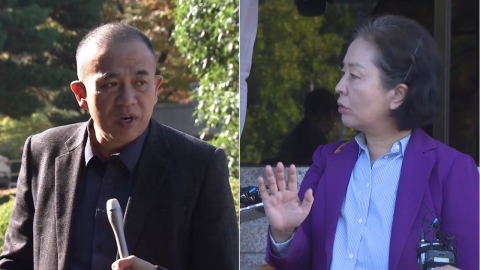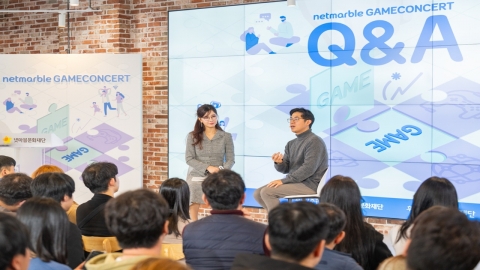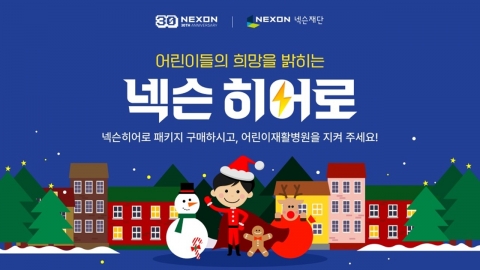■ Starring: Yeom Seung-hwan, director of LS Securities
* The text below may differ from the actual broadcast content, so please check the broadcast for more accurate information. Please specify [YTN NewsNOW] when quoting.
[Anchor]
Amid the continued sluggish domestic demand, the proportion of clothing among consumer spending in the third quarter fell sharply. Concerns are also growing that low growth could become entrenched. Let me analyze the economy. Yeom Seung-hwan, director of LS Securities, came out. Welcome.
[Yum Seung Hwan]
Hello,
[Anchor]
They say domestic demand is difficult, but they say they don't buy clothes these days. What kind of phenomenon should I look at this?
[Yum Seung Hwan]
First of all, we usually use durable goods and semi-durable goods, but in the case of durable goods, we usually use them for more than a year, and high-priced products and cars are typical, and semi-durable goods are clothes. Because we usually buy clothes and wear them for more than a year. But it's not an expensive product. Therefore, it would be good to think that one of the things that is sensitive to immediate consumption is clothing.
So we can't cut back on food, things like cosmetics, even if the economy is bad. But I won't buy clothes this year, but I can buy them next year.
[Anchor]
You can wear what you bought last year.
[Yum Seung Hwan]
As a result, the fact that clothing and shoes are consumed means that the economy is not so good right now, and the economic experience is so bad that there is a lot of anxiety about whether it will improve in the future. In fact, the proportion of clothing and shoes in consumption expenditure in Korea was about 7-8% in the past, but it fell to 3.9 when it was announced this time. Instead, what's gone up is housing, water, heat spending, food, these are products that we have to spend anyway. As such, it seems that this indicator can also feel that Korea's domestic demand is changing due to recession-type consumption.
[Anchor]
Domestic demand is not good or bad, but since you're in the economy, is it really cold?
[Yum Seung Hwan]
I also work in Yeouido, so on weekends and weekdays... But I don't know what I've been feeling these days. I don't know if it's just me, but there aren't as many people in the restaurant as there used to be. I'm sure I gave it to you, but I don't feel good enough that the houses that were well-booked can go in without waiting. In particular, I've been thinking that self-employed people are being hit hard.
[Anchor]
President Yoon Suk Yeol talked about domestic demand today. It means that there has been a lot of cold wind lately to tell the staff to come up with measures to revitalize domestic demand. What are the step-by-step measures to revitalize domestic demand?
[Yum Seung Hwan]
If you want to be able to do it step by step, the best way is to give coupons or cash, actually. the best of all But it's a debt because it's pulling the money that you have to spend in the future in advance. So, there may be side effects later, but the best thing is to give money to spend it right now. We've done it during COVID-19. The effects have been seen a lot in the US, and China has never actually given cash, so it took a long time to escape from COVID, but that's a really heinous prescription. But it's not easy to use this because we have some financial and tax issues. So it's actually not easy to boost consumption right now.
So if you look at it in about three to six months, not right away, I think there will be two things. The first thing is to cut interest rates. If I cut interest rates, my disposable income will increase. So first of all, what the Bank of Korea was surprised about this time was that most of the securities companies saw that they would not cut interest rates this time. However, the surprise seems to have contributed to the sluggish domestic demand, so it can usually affect consumption after a few months, and another thing is that prices fall. However, oil prices have a lot of impact on falling prices. Like the price of gasoline. However, although gasoline prices have not changed significantly recently, Trump's policy seems to be very strong to lower oil prices.
Then if those things become visible next year. So, many institutions now have these conditions that next year's consumption will be okay. However, it doesn't work as soon as the president wants, but it takes months. So, the way to make up for it in a timely manner is difficult because there is no right way other than cash payment. And structurally, you have to raise your wages or jobs anyway. However, because Korea's recent growth rate has slowed, even that is not easy, so we believe that interest rate cuts or price stability will be the best ways.
[Anchor]
When talking about dark economic clouds, we have to talk about the KOSPI these days, but the KOSPI has been going downhill for almost five months, right?
[Yum Seung Hwan]
It has been falling for five consecutive months.
[Anchor]
I think it's a pretty unusual trend.
[Yum Seung Hwan]
There were two times when I lost the most weight in 2000 and 2008 for six consecutive months. Everyone had a crisis back then.
IT bubble, because of the 2008 financial crisis. But actually, it's not a crisis right now. The whole world is not in crisis. The most difficult thing this time is that only Korea is doing this.
[Anchor]
There is a saying that Ukraine has a higher decline rate than Korea.
[Yum Seung Hwan]
Except for Russia and Ukraine during the war, Korea was the most out, but the KOSPI fell nearly 10% this year alone. So, it's a very bad situation right now, but especially in the case of Nasdaq, the rate of increase this year will be about 28% for Nasdaq. Looking at that, it is being alienated from the global stock market, and Japan has risen considerably in the entire year. Only Korea is in negative territory, so it seems to be a very difficult situation for those who have invested in the domestic stock market.
[Anchor]
Isn't there a reason why investors leave?
[Yum Seung-hwan]
Some foreigners have left. There are a lot of rumors about Samsung Electronics' crisis these days that foreigners have left, and one thing is that unlike before, we have become a competitor with China. We exported to China a long time ago. Then they made the product and the U.S. exported it. It's changed now. Even if we export, China is self-sufficient in all the parts called intermediate goods. That's why President Xi Jinping emphasized those things again this time. I'll be self-sufficient. Then, we have a lot of export routes to China, but this part is likely to be less competitive, so I think there is this. Another reason why individual investors leave Korea as a whole is that the Korean stock market is less reliable. There were inappropriate actions by some companies, and the performance of cryptocurrency and the U.S. stock market this year was so good. That's always the case with stocks. I do a lot of relative evaluations. Therefore, other countries perform much better than investing in Korean stock markets in Korea, so they are moving to that direction. So I think it's a situation where many people are leaving because the Korean stock market is relatively unattractive.
[Anchor]
According to people who do a lot of stocks around them, KOSPI's domestic stocks tend to fall out with a single stroke, buy foreign stocks, and leave foreign stocks for a long time.
[Yum Seung Hwan]
The domestic stock market was bound to be like that, and it's good when representative companies go up in stock prices. Samsung Electronics also had more than 90,000 won a few years ago, but now it's 50,000 won. So Nvidia's stock price has increased more than 10 times. In the U.S. stock market, when I invest in a good company, it works when I steadily make long-term investments. Even if I lose money when I fall, I have a strong belief. In the Korean stock market, such companies are very small, and eventually, if I can't sell stocks when I go up, I lose more money. There are many reasons, but Korea is a very sensitive country to the economy, unlike the United States. But the economy usually goes up and down every two years. In those times, if you invest in a good time, you will lose a lot of stock prices and damage your principal a lot in the past, so as you said, it seems to have been fixed. Korea will just sell it when it makes moderate profits and rather invest in the U.S. for a long time with profitable money. This psychology seems to be getting worse this year.
[Anchor]
But usually, even if the stock market is bad, it's called Santa Rally at the end of the year and Christmas. You know, there's such a sharp rebound.
What do you think this year will be like?
[Yum Seung Hwan]
It's already started again in December this year, and the first day of this year was good, but it's falling out again now. So I'm sorry to hear that.
[Anchor]
It went up this morning, but did it fall again now?
[Yum Seung Hwan]
Now, it is on the decline and Samsung Electronics is out, so the Korean stock market is still lacking domestic demand. But usually, companies pay dividends at the end of the year in December and next year in April, after the general shareholders' meeting. Then, the stockholder's list is usually confirmed at the end of December. These people are shareholders this year. They give dividends to them, so I buy stocks in advance to get dividends. That's why people usually buy it in December. What's regrettable about this year is that institutional investors are buying hard, but foreigners are not attracted to the Korean stock market at all. However, foreign investors only cut back on selling anyway, and I don't know if it will be this week or next week, but if a purchase comes in, it always came in at the end of the year. Then, many people may not expect Santa Rally, but some rallies may come out, so we need to check the trends of foreign investors.
[Anchor]
Domestic demand is not good these days and the KOSPI market is like this, so there are predictions that the Korean economy will grow low next year, but the problem is that there may be cycles in the economy, and we were worried that this was really going to low growth like Japan. How do you see that, personally?
[Yum Seung Hwan]
In the past, Japan's low growth has actually been very long due to the bursting of bubbles and collapsing asset prices, but Korea's situation now seems to be similar to Germany and Europe rather than the asset price bubble. Because Germany and Europe were doing well, but if you look at the recent news, Europe's competitiveness is poor. One of the reasons that is mentioned a lot is the competitiveness with China. That's why it's the same in China. We also sold a lot of goods to China, especially Volkswagen in Germany sold a lot of cars in China. They say that 50% of their sales come from China. But the situation of Chinese cars is that most people buy electric cars. One of the two people is in an electric car. China is the number one electric car in the world right now. And it's also cheap. However, the high labor costs in Europe can't handle it. But it's not just a problem in Germany, but it's also contrasting with us. Korea used to export a lot to China, but in the end, as China is self-sufficient and we are fiercely competing with Chinese products in other countries, we are increasingly faced with a very strong wall called China to grow as high as before. So, one of the reasons why the Bank of Korea has recently lowered its growth forecast is that there is a big wall of tariffs over the next four years in the Trump era.
We are a country that makes a living by exporting. Since these are uncertain, it is often said that it is a potential growth rate, a growth rate at which we can invest everything to grow. It usually catches 2% of it now, but the Bank of Korea has lowered its growth rate to 1.9%, so it seems that these are quite worrisome that low growth will become fixed.
[Anchor]
It is a depressing situation where bad news continues to overlap, and these analyses are coming out, but you said a little while ago that China will take a large part of the market with ours, and semiconductors were our main export item, and it is written by Chip War. Professor Chris Miller said this. He said that Korea could use Chinese chips in the future and that such an era could come soon.
[Yum Seung Hwan]
In my opinion, one of the reasons why I think this is not possible is, of course, a threat. And the background of this conversation is that Samsung Electronics and Hynix factories are there. They produce a lot there. However, due to US regulations, it is called advanced semiconductor equipment. It's hard to get a lot of those things in the future. However, our factories make high-tech semiconductors, but China is slightly restricted due to U.S. regulations. However, Korea can mount such products on low-priced products, but high-end products such as high-tech products and smartphones and AI products are actually not enough to make because China does not have such equipment. However, of course, it will be different if the U.S. lifts regulations.
This person may be right. However, in the case of President-elect Trump, China's regulations may be tightened. If we regulate general-purpose semiconductors and slightly cheaper semiconductors other than high-tech semiconductors now, China could be hit hard. So it's true that I'm concerned. It is true that China is chasing too much, but Trump's semiconductor policy has not yet come out clearly. If we check it, this may become a reality, but it may not be possible, so I think we need to look at the policies of the next U.S. administration first and respond to them rather than just being too concerned.
[Anchor]
As a result, I think how to find new growth engines quickly can be the way out to lead the Korean economy to an upward trend. Finally, I'm going to ask you this because this article is a little interesting. If You Invested 100 Million 10 Years Ago, What Would It Be Worth Now? There is a comparison between 2014 and now, and it would be nice if you could show it in a graphic manner. Bitcoin and Pure Gold, Samsung Electronics Shares If I invested 100 million won 10 years ago, how much is it now? It's important. Bitcoin is worth about 16.2 billion and pure gold has tripled to 300 million. And if I invested 100 million won in Samsung Electronics shares 10 years ago, now it's about 214 million won. We're showing you this because an article came out, but many people feel deprived of why I didn't buy coins while watching this. What do you think?
[Yum Seung Hwan]
No one expected Bitcoin to go like that then. In fact, it's consequential, but what I can feel over there is Tesla. In the U.S., Nvidia, and Korea, there will be companies that have risen as much as I did.
[Anchor]
How Much Did Tesla Go Up?
[Yum Seung Hwan]
Wouldn't Tesla also have increased 100 times if the price was at that time? Because the price was quite low at the time. It was time to make electric cars small. But actually, it's consequential now, but the key we can see over there is why Samsung Electronics couldn't go. Samsung Electronics can't go up 100 times. However, Samsung Electronics represents the Korean stock market, and the Korean stock market is not being selected around the world because it is difficult to say that it has grown that much when it is twice the size of a decade. Although there are our structural problems and many other things. So in the end, not only Samsung Electronics but also the Korean stock market needs to find a driving force for structural growth, so I don't think such an article will come out. Anyway, isn't it a priority to revive Korea's competitiveness over Bitcoin?
[Anchor]
Looking at that, you'll think you should buy coins quickly, but rather than that, it's more important to increase the competitiveness of our economy, so I'll summarize the message.
[Yum Seung Hwan]
I think that's more important.
[Anchor]
I was the director of LS Securities, Yeom Seung-hwan. Thank you.
※ 'Your report becomes news'
[Kakao Talk] YTN Search and Add Channel
[Phone] 02-398-8585
[Mail] social@ytn. co. kr
[Copyright holder (c) YTN Unauthorized reproduction, redistribution and use of AI data prohibited]
Economy
More- The number of subscribers to the Seoul metropolitan area this year is about 1.13 million...Greater concentration in the Seoul metropolitan area
- Large and medium-sized occupancy volume exceeding 85㎡ in Seoul plunges from next year
- [Company] Woowa Brothers "self-diagnose loneliness with Baemin app"
- [Company] CJ CheilJedang Targets Overseas Noodle Market...Bulgogi and Tteokbokki Flavor Launched in Europe

![[Breaking News] Report to the plenary session of the National Assembly on the impeachment of Choi Hae-soo, chairman of the Board of Audit and Inspection, and Lee Chang-soo, chief of the Central District Prosecutors' Office.](https://image.ytn.co.kr/general/jpg/2024/1202/202412021428017445_h.jpg)

!["Bloody bread"...Three women were crushed to death in the crowd of a Gaza bakery [Anchor Report]](https://image.ytn.co.kr/general/jpg/2024/1202/202412021540547790_h.jpg)

![[Yeterview] Baek Ji-young "Dramatic collaboration with Kangta..."I received gentle directions".](https://image.ytn.co.kr/general/jpg/2024/1202/202412021451267442_h.jpg)



